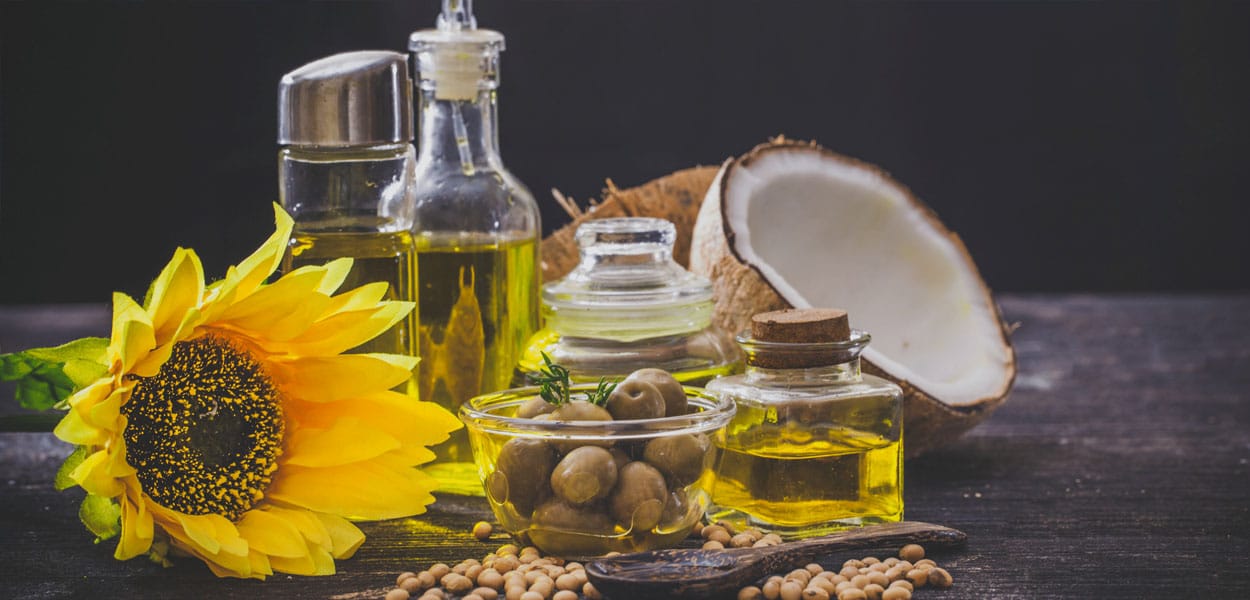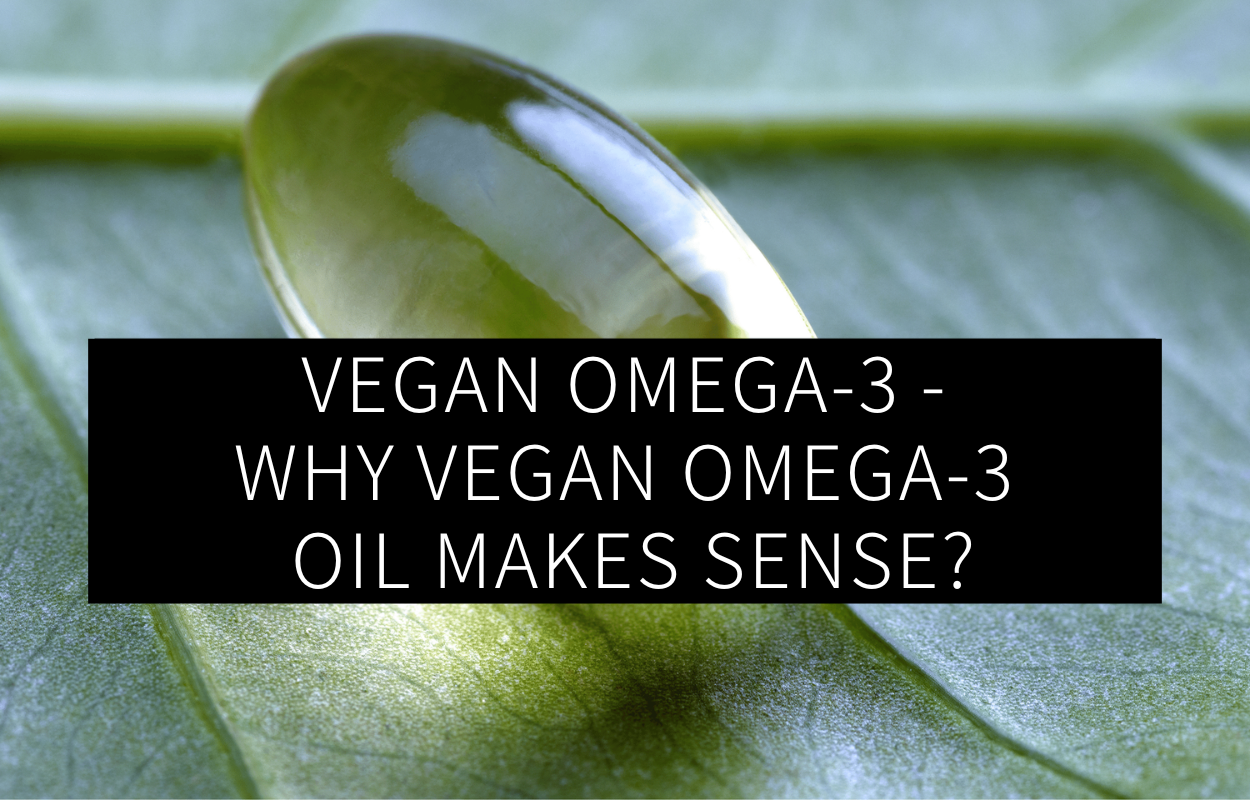Vegan omega-3 is of great importance for vegans, as they cannot produce the fatty acid themselves and therefore rely on external sources.
Omega-3 fatty acids are essential fatty acids that we need to consume daily since our bodies cannot produce them. While fish and cod liver oil are particularly rich in omega-3 fatty acids, they are not part of a vegan diet. This leads many vegans to wonder which plant-based foods contain vegan omega-3 in order to meet their essential fatty acid needs. One option for obtaining these fatty acids is through vegan omega-3 algae oil, which has a particularly high content of omega-3 fatty acids.


1. What are omega-3 fatty acids?
Omega-3 fatty acids are a type of polyunsaturated fatty acids that are essential for our bodies. Since we cannot produce them ourselves, we rely on obtaining them from external sources and should regularly incorporate them into our diet. The following are types of omega-3 fatty acids:
Alpha-linolenic acid is primarily found in plant-based foods, while DHA and EPA are found in fatty fish and microalgae. EPA and DHA are considered particularly valuable as the body can convert these fatty acids into eicosanoids, which are believed to have anti-inflammatory properties.
Did you know that fish and seafood have a high content of omega-3 fatty acids because microalgae serve as their food source? For vegans, microalgae can be a valuable source of omega-3 fatty acids.
When considering omega-3 fatty acid intake, it is important to pay attention to the ratio of omega-3 to omega-6 fatty acids. Omega-6 fatty acids, also polyunsaturated fatty acids, are often seen as „opponents“ to omega-3 fatty acids. While omega-3 fatty acids are believed to have anti-inflammatory effects, omega-6 fatty acids are suspected of promoting inflammation. One well-known omega-6 fatty acid is arachidonic acid, which is believed to contribute to the formation of certain tissue hormones and free radicals.
Many plant oils, including safflower, corn germ, and pumpkin seed oil, have a high content of omega-6 fatty acids. As a result, foods with omega-3 fatty acids are less common on our plates compared to foods with omega-6 fatty acids, even though the ratio of omega-6 to omega-3 fatty acids is estimated to be around 15:1, while the recommended ratio is 5:1. Achieving a 1:1 ratio, as presumed for our Paleolithic ancestors, is hardly possible in today’s diet.

 There are plenty of foods with a relatively high amount of omega-3 fatty acids, allowing you to meet your essential fatty acid needs through a plant-based diet. Experts recommend that 0.5 percent of total energy intake should come from omega-3 fatty acids, and a minimum of 30 percent of the diet should consist of fats.
Some of the best vegan foods with a high content of alpha-linolenic acid (ALA) include:
There are plenty of foods with a relatively high amount of omega-3 fatty acids, allowing you to meet your essential fatty acid needs through a plant-based diet. Experts recommend that 0.5 percent of total energy intake should come from omega-3 fatty acids, and a minimum of 30 percent of the diet should consist of fats.
Some of the best vegan foods with a high content of alpha-linolenic acid (ALA) include:
2. What are vegan sources of omega-3 fatty acids?
Vegan omega-3 fatty acids are essential fats derived from plant-based sources. This primarily includes alpha-linolenic acid (ALA), which the body cannot immediately metabolize into the usable omega-3 fatty acids EPA and DHA. Although one might think that the ratio of omega-3 to omega-6 fatty acids is better in vegans, the frequent use of plant oils, plant-based margarines, and nuts contributes to an increased intake of omega-6 fatty acids. In a vegan diet, the proportion of omega-3 fatty acids can be increased without relying on plant oils that not only contain omega-3 fatty acids but also a high amount of omega-6 fatty acids. The solution is vegan omega-3 algae oil, which is derived from microalgae and is as rich in EPA and DHA as fish and seafood. Unlike omega-3 fatty acids from plant-based foods, the fatty acids in microalgae do not need to be converted by the body – they can be used immediately, which can be a significant advantage for vegans. Fish and seafood are generally considered excellent sources of omega-3 fatty acids, but they are not suitable for everyone. Many individuals, including vegans and vegetarians, abstain from fish due to personal, health, or ethical reasons, as well as the fish’s distinct taste and smell. Another critical factor contributing to the growing number of people avoiding fish and seafood is the contamination of these foods with harmful substances such as mercury and microplastics. Additionally, many fish species are endangered due to overfishing. Vegan omega-3 algae oil, exclusively derived from microalgae, appears to be a valuable source of omega-3 fatty acids not only for vegans and vegetarians but also for individuals seeking an alternative to fish.
3. What are the benefits of vegan omega-3 oil?
One of the significant advantages is that vegan omega-3 algae oil provides a plant-based source of omega-3 fatty acids. As a biohacker, you no longer have to worry about where to obtain these valuable fats found primarily in fatty fish. While there are plant-based foods with a considerable amount of omega-3 fatty acids, they are present as ALA and not as EPA and DHA. Although the body can convert alpha-linolenic acid (ALA) into EPA and DHA, this process requires energy, resulting in a lower „yield“ of omega-3 fatty acids compared to the content in microalgae. Microalgae have a high biological value, meaning that the body can efficiently utilize them compared to other plant-based foods. Omega-3 fatty acids are essential for the body, which is why they are appropriately called „essential.“ These fatty acids are attributed with several positive effects on health and well-being. They are believed to have a positive impact on cholesterol levels, brain function, and cardiovascular health. Omega-3 fatty acids are also associated with anti-inflammatory effects.
4. What are the benefits of omega-3 fatty acids for biohackers?
Omega-3 fatty acids can offer many benefits for biohackers. Researchers believe that vegan omega-3 oil can positively affect well-being by contributing to serotonin synthesis. The term „happiness hormone“ can be taken quite literally here. Insufficient serotonin levels can lead to depressive moods. Therefore, it is essential to regularly supply the body with omega-3 fatty acids to promote serotonin production. Vegan omega-3 oil may also have an impact on cognitive and physical performance. The higher the content of omega-3 fatty acids in your body, the more serotonin you are thought to be able to produce. This is yet another reason to make vegan omega-3 oil a regular part of your diet.- Flaxseed oil (54g per 100g)
- Chia seeds (19g per 100g)
- Flaxseeds (16.7g per 100g)
- Walnut oil (12.9g per 100g)
- Walnuts (7.5g per 100g)





